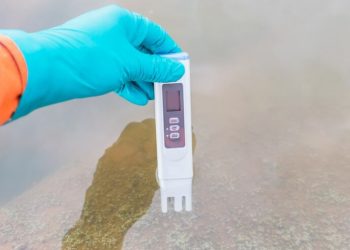Are you tired of dealing with clogged pipes, damaged appliances, and dull laundry? These are all common issues caused by hard water. Thankfully, there is a solution – a water softener. This simple yet effective system can protect your home’s water-using appliances from the damaging effects of hard water. Let’s take a closer look at how a water softener works and why it is essential for maintaining the quality and longevity of your appliances.
Understanding the Impact of Hard Water on Your Home Appliances
Hard water may seem harmless, but it can wreak havoc on your home appliances. The high mineral content in hard water, typically calcium and magnesium, can cause a wide range of issues. Over time, these minerals can build up inside your pipes, resulting in clogs and reduced water flow. Not only can this be frustrating, but it can also lead to costly repairs.
Hard water can also leave behind unsightly residue on your appliances. Have you noticed white spots or stains on your dishwasher, coffee maker, or washing machine? These are signs of hard water damage. The minerals in the water can create a layer of scale on the heating elements of these appliances, reducing their efficiency and lifespan.
In addition to the visible effects, hard water can also impact the performance of your appliances. Your dishwasher may struggle to clean your dishes effectively, or your washing machine may leave your clothes looking dull and faded. The minerals in the water can interfere with the cleaning process and leave behind a residue, making it harder for your appliances to do their job properly.
To protect your home appliances from the damaging effects of hard water, investing in a water softener is crucial. A water softener removes the excess minerals from the water, preventing scale buildup and improving the efficiency of your appliances. By installing a water softener, you can ensure that your appliances operate at their best, extending their lifespan and saving you money on repairs or replacements.
In the next section, we will dive deeper into how a water softener works and why it is the perfect solution to combat hard water issues in your home.
How Does a Water Softener Work?
Have you ever wondered how a water softener actually works? Well, wonder no more! In this section, we will explore the inner workings of a water softener and how it effectively removes minerals from your water to protect your appliances.
At the heart of a water softener is a tank filled with resin beads. These beads are coated with a special substance called ion exchange resin. When hard water flows through the tank, the resin beads attract and capture the calcium and magnesium ions present in the water. As a result, the water that exits the water softener is now free of these minerals.
But how does the water softener remove these captured minerals from the resin beads? That’s where the salt comes into play. The water softener has a separate brine tank that contains a salt solution. During a process called regeneration, the salt solution is used to clean the resin beads. The high concentration of sodium ions in the salt solution displaces the calcium and magnesium ions on the resin beads, effectively rinsing them away.
Once the regeneration process is complete, the water softener is ready to soften water again. It’s important to note that the salt used in the brine tank needs to be replenished periodically to ensure the water softener can continue to operate effectively.
By using the ion exchange process and regeneration, a water softener can efficiently remove the minerals that cause hard water, leaving you with soft and smooth water that is gentle on your appliances. In the next section, we will discuss the many benefits of using a water softener for your appliances.
The Benefits of Using a Water Softener for your Appliances
Investing in a water softener can provide numerous benefits for your home appliances. First and foremost, a water softener protects your appliances from the damaging effects of hard water. By removing the excess minerals, such as calcium and magnesium, from your water, a water softener prevents scale buildup and clogs in your pipes, ensuring optimal water flow. This not only prevents frustrating plumbing issues but also extends the lifespan of your appliances, saving you money on costly repairs or replacements.
In addition to preventing damage, a water softener also improves the performance of your appliances. With soft water, your dishwasher will clean your dishes more effectively, leaving them spotless and shiny. Your washing machine will be able to remove stubborn stains from your clothes, resulting in brighter, fresher-looking laundry. By eliminating the minerals that interfere with the cleaning process, a water softener allows your appliances to work more efficiently and deliver superior results.
Furthermore, using soft water can also save you money on detergent and energy bills. With soft water, you’ll require less detergent to achieve the same cleaning results. Additionally, your appliances will operate more efficiently, reducing energy consumption and lowering your utility costs.
Choosing the Right Water Softener for Your Home
When it comes to choosing the right water softener for your home, there are a few key factors to consider. The first step is to determine the size of the water softener that you need. This is determined by the hardness of your water and the amount of water your household uses on a daily basis. If you have particularly hard water or a large household, you may need a larger capacity water softener to ensure optimal performance.
Next, consider the type of water softener that will best suit your needs. There are several types available, including salt-based and salt-free options. Salt-based water softeners are the most common and effective at removing minerals from your water. However, if you are concerned about sodium levels or prefer a more environmentally friendly option, a salt-free water softener may be the better choice.
It’s also important to consider the quality and reputation of the water softener brand. Look for a reputable manufacturer that offers reliable products and excellent customer support. Reading reviews and seeking recommendations from friends or professionals can help you make an informed decision.
Finally, consider your budget. Water softeners vary in price, so it’s important to find one that fits within your budget while still meeting your needs. Remember, investing in a high-quality water softener can save you money in the long run by preventing damage to your appliances and reducing maintenance costs.
By carefully considering these factors, you can choose the right water softener for your home and enjoy the benefits of soft, mineral-free water for years to come.
Easy Maintenance Tips for Your Water Softener
Maintaining your water softener is essential to ensure its optimal performance and longevity.
Here are some easy maintenance tips to keep your water softener running smoothly:
1. Regularly check the salt level: Salt is a crucial component in the water softening process, so it’s important to check the salt level in the brine tank regularly. Keep the tank at least half full to ensure proper regeneration and efficient removal of minerals.
2. Clean the brine tank: Over time, salt can accumulate and form a residue at the bottom of the brine tank. To prevent clogs and ensure proper functioning, clean the tank every few months. Simply drain the tank and scrub away any debris or residue.
3. Inspect and clean the resin tank: The resin tank houses the resin beads that capture the minerals from the water. Periodically check the tank for any signs of damage or resin buildup. If necessary, clean the tank using a soft brush and mild detergent.
4. Test the water hardness: Even with a water softener, it’s a good idea to periodically test the hardness of your water. This will help you determine if any adjustments or additional maintenance is required. Testing kits are readily available at hardware stores or online.
5. Schedule professional servicing: While regular maintenance can be done by homeowners, it’s recommended to have a professional service your water softener annually. They can perform a thorough inspection, test the system’s efficiency, and address any issues that may arise.
By following these maintenance tips, you can ensure that your water softener continues to provide you with soft, mineral-free water and protect your appliances for years to come. Don’t neglect the upkeep of your water softener – a little maintenance goes a long way in keeping your appliances running smoothly. If you are looking for an Indianapolis water softener, check out Coopers.









